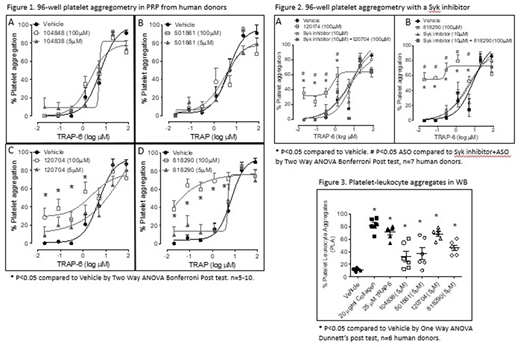Abstract
Introduction
Antisense oligonucleotides (ASOs) are a new class of single-stranded DNA based drugs that hold great therapeutic promise for their disease modifying potential in a wide range of genetic diseases. Preclinical toxicology studies in monkeys, as well as late stage clinical trials in humans, have upon repeated dosing, reported events of ASO sequence-specific lowering of platelet counts (mild to severe thrombocytopenia) (Henry et al. Nucleic acid therapeutics 2017). The underlying cause of this platelet decrease is still unclear in humans. We have investigated if the thrombocytopenia associated with ASOs is due to either impaired platelet production and/or destruction of platelets (clearance) due to increased platelet reactivity (activation/aggregation status). Preliminary data from mouse derived fetal liver megakaryocytes suggest that pro-platelet production does not seem to be reduced by ASOs and hence in the current study we hypothesized that the ASO-induced thrombocytopenia is due to increased clearance of platelets from the circulation.
Methods
In the current study we explored how ASOs affect platelet aggregation in platelet rich plasma (PRP) and platelet-leukocyte aggregates in whole blood (WB) obtained from healthy volunteers after informed consent. PRP or WB was treated with a clinically relevant concentration of ASO (5µM) corresponding to expected maximum plasma concentration levels, or a 20x-supra-therapeutic concentration (100µM). Four ASOs were tested: two CpG-rich phosphorothioate deoxyoligonucleotide (PS ODN) sequences: 818290 and 120704, and two non-CpG 2'-MOE containing sequences: 104838 and 501861. 818290 was included as a positive control since it has been shown to cause direct platelet activation (Flierl et al. JEM 2015). 104838 have been reported to cause moderate, dose dependent drops in platelet counts in monkeys and humans, with platelet sequestration in the liver and spleen (Narayanan PK, et al. Toxicol Sci. 2018). 501861 has triggered sporadic severe thrombocytopenia in select monkeys. ASO treated PRP was analyzed for platelet aggregation using 96-well optimul aggregometry (Lordkipanidzé et al. Blood 2014) in the presence of vehicle (PBS) or 6 concentrations of thrombin receptor activating peptide-6 (0.08-80µM,TRAP6). In a separate experiment, PRP was incubated with ASOs plus the spleen tyrosine kinase (Syk) inhibitor PRT-060318 (10µM). ASO treated WB was incubated with fluorescently labelled CD41/61 antibody to label platelets and a leukocyte-specific antibody CD14, and platelet-leukocyte aggregates were analyzed by FACS according to (Gerrits et al. Curr. Protoc. 2016).
Results
The two non-CpG rich 2'-MOE ASO sequences 104838 and 501861 did not affect platelet aggregation at either concentration (5µM + 100µM) (Figure 1 A+B). Whilst the two CpG-rich PS ODN ASOs (818290 and 120704) triggered spontaneous platelet aggregation in PRP at 100µM (Figure 1 C+D), that was normalized by co-incubating these ASOs with a Syk inhibitor (Figure 2). 5µM of ASO treatment triggered a significant increase in platelet-leukocyte aggregates in WB for all the ASOs tested (Figure 3).
Conclusion
We have shown that the two CpG-rich PS ODN ASOs (818290 and 120704) triggered spontaneous platelet aggregation in PRP at 100µM. This effect was inhibited by a Syk inhibitor. 818290 has previously been identified to activate platelets through a Syk-dependent, GPVI receptor mediated mechanism (Flierl et al. JEM 2015). Here, we report for the first time that the aggregatory effects of 120704 have been identified to be Syk dependent as well, possibly through a similar interaction with platelet GPVI receptors.
We have also presented novel data that therapeutically relevant concentrations of all the ASOs tested cause an increase in platelet-leukocyte aggregates in WB. Based on these data we highlight the importance of screening ASOs in multi-cellular assays, not just PRP, since there was no effect of the ASOs 104838 or 501861 on platelet aggregation. Enhanced formation of platelet-leukocyte aggregates could be one contributing factor for increased platelet clearance, explaining ASO-induced thrombocytopenia. Further investigation into the ASO-induced interactions between platelets and immune cells are warranted. Defining the mechanisms by which ASO-based drugs cause low platelet count may yield strategies to manage this drug-induced thrombocytopenia in patients.
Thon:Platelet Biogenesis: Employment, Equity Ownership, Other: Co-founder, Patents & Royalties. Henry:Ionis Pharmaceuticals: Employment. Narayanan:Ionis Pharmaceuticals: Employment. Italiano:Platelet Biogenesis: Equity Ownership, Other: Co-founder, Patents & Royalties.
Author notes
Asterisk with author names denotes non-ASH members.


This feature is available to Subscribers Only
Sign In or Create an Account Close Modal